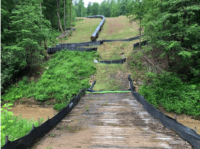The U.S. Environmental Protection Agency has asked six natural gas drillers to disclose by May 25 information on how and where they dispose of or recycle drilling process water in the Marcellus shale region.
"We want to make sure that the drillers are handling their wastewater in an environmentally responsible manner," said EPA mid-Atlantic Regional Administrator Shawn Garvin in a statement. "EPA is continuing to work with Pennsylvania Dept. of Environmental Protection officials who are on the frontlines of permitting and regulating natural gas drilling activities in Pennsylvania."
The companies receiving information requests are: Atlas Resources, L.L.C.; Talisman Energy USA, Range Resources—Appalachia, Ll.C.; Cabot Gas and Oil Corporation; SWEPI, LP and Chesapeake Energy Corporation. According to EPA, these six companies account for more than 50% of the natural drilling in Pennsylvania.
This EPA action comes on the heels of a request in late April by Acting PADEP Secretary Michael Krancer asking drillers to voluntarily stop taking their wastewater to 15 publicly owned treatment plants by May 19. PADEP revised its Total Dissolved Solids regulations in 2010. The revised regulations required publicly owned treatment works and centralized waste treatment facilities to treat new or increased discharges of TDS to more stringent standards.
Removing TDS from water also removes bromides. According to the PADEP, recent surface water sampling has found elevated levels of bromide in rivers in Western Pennsylvania, where the majority of natural gas drilling is taking place. While bromide itself is not considered toxic, it turns into a combination of potentially unsafe compounds called Total Trihalomethanes once it is combined with chlorine for disinfection at water treatment facilities.
Over the past year, news reports in the New York Times and other outlets highlighted the inability of some aging treatment plants in Pennsylvania to adequately treat the industrial wastewater from natural gas extraction. As a result of the revised regulations, some facilities voluntarily decided to stop taking drilling wastewater. However, 15 continued to accept natural gas wastewater, as long as they did not increase the total amount received.



